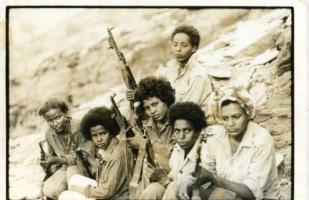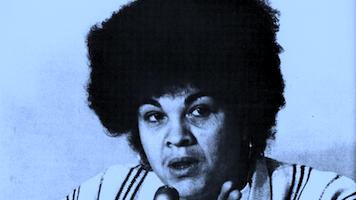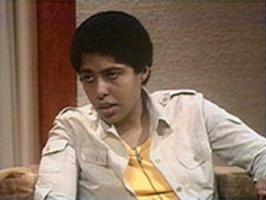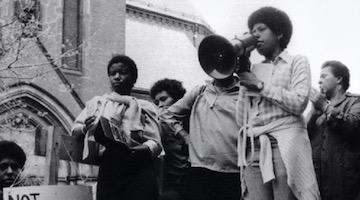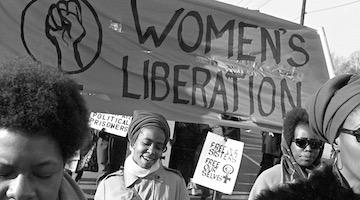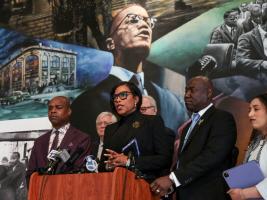In this series, we ask acclaimed authors to answer five questions about their book. This week’s featured author is Mecca Jamilah Sullivan. Sullivan is Associate Professor of English at Georgetown University. Her book is The Poetics of Difference: Queer Feminist Forms in the African Diaspora.
Roberto Sirvent: How can your book help BAR readers understand the current political and social climate?
Mecca Jamilah Sullivan: One thing I find striking about our current moment is that “intersectionality” has become a common phrase in cultural discourse, yet often the depth and nuance of the theory have been obscured, as have its specific origins in black feminist thought. As term generated by a black woman thinker, Kimberlé Crenshaw, to describe our mutually-imbricated experiences of racism, sexism, and other forms of oppression, intersectionality is a term that theorizes its own misreading. It offers language for the very mechanisms of erasure and silencing used to dismiss it and/or to evacuate it of meaning. In my view, intersectionality invites us to think capaciously about human difference and the vast network of linked oppressions that shape our cultural landscape, and to undertake this thinking in ways that specifically and explicitly center black women. Given this, it’s not surprising that the term is often vacated of its most pivotal, most urgent meanings, and misread, on one hand, as a generalizable (and therefore politically diffuse) description of difference or, on the other hand, as an overly-specific language for describing the personal pains and complaints of black women (which, in a political system that disregards black women, also renders the term politically ineffective). The Poetics of Difference hopes to show, among other things, that intersectionality offers both a broad theoretical perspective on difference and a pointed political critique of racial heteropatriarchy, precisely because the racism and sexism black women experience is inseparable from the innumerable other forms of difference and power that shape our lives. As the Combahee River Collective suggests, centering black womanhood—and black queer womanhood specifically—in our political vision allows us to imagine truer forms of freedom.
What do you hope activists and community organizers will take away from reading your book?
I think many black queer and feminist activists and organizers share this sense of the “urgency of intersectionality,” as Crenshaw puts it. I hope that my book offers a helpful perspective on the concept’s pre-history and its current reach in and through black feminist literary cultures. I see the works of creative writers and artists like Audre Lorde, Bessie Head, Ntozake Shange and others as key proto-texts for what we now term “intersectionality.” These writers theorize the precise interconnectedness of race, gender, class, sexuality, disability, body shape and size, nationality, and numerous other nodes of power in their creative work. The do so by centering difference in the form of their texts, inventing new genres, forms, and languages for describing articulating black women’s experiences of difference and power. Likewise, more recent creators like Dionne Brand, Akilah Oliver, Zanele Muholi, and Pam Dlungwana extend this legacy on a contemporary global stage. In this way, I want to show that “intersectionality” is not only a pivotal term for political discourse and activist work, but that it is also one with a deep history in black feminist literary culture. I want to show that the crucial political work of intersectionality is being done as we speak by black queer and feminist literary artists today.
We know readers will learn a lot from your book, but what do you hope readers will un-learn? In other words, is there a particular ideology you’re hoping to dismantle?
This is a great question, and I’m not sure that I’ll answer it fully. One thing that strikes me each time I teach my Black Feminist Literature and Black Queer Studies courses is the extent to which our students are trained in a very familiar (and often destructive) Western model of knowledge production. This model recapitulates heteropatriarchal visions of intellect and “rationality” as separate from and superior to embodiment and feeling; this logic also values skillful performance of mastery over the vulnerability of learning. Even in intellectual spaces that acknowledge the deeply racist, capitalist, heteronormative, Anglocentric, cisnormative, heteropatriarchal, and ableist underpinnings of these logics, they still dominate huge swaths of the academic landscape, often with the effect of silencing the voices of black, brown, queer, trans, and woman voices (our students’ and perhaps our own). I hope the Poetics of Difference interrupts this pedagogy, within academia and beyond it. By showing how black feminists’ creative expressions of embodiment, feeling, and queer subjective desire are theoretical interventions in themselves, I propose that we un-learn the false lesson that the body does not teach, that feeling does not move politics, and that poems, stories, photographs and rap songs do not theorize. Black queer and feminist art does all this and more.
Who are the intellectual heroes that inspire your work?
When I speak about this book, I feel like I am in an ongoing inner conversation with Audre Lorde. The last question, for example, had me thinking about her argument in “Poetry is Not a Luxury,” which is a guiding text for my academic and creative work. In that essay, she theorizes poetry as a necessary political tool that “…forms the quality of the light within which we predicate our hopes and dreams toward survival and change, first made into language, then into idea, then into more tangible action.” This argument is basically it for me. This is why I write, why I read. It’s also why I teach, and why I teach literature in particular. I see this logic at play in the work of the other writer-theorists I admire: Ntozake Shange, Toni Morrison, Toni Cade Bambara. Hip hop is also a major influence for me. Missy Elliot, Cardi B, and the queer Cuban rap group Krudxs Cubensi are among the brilliant writers whose ideas about gender, sexuality, and embodiment help me think through my own. As a creative writer and a scholar, all these artists have helped me name my intellectual priorities and resist institutional logics that suggest we must choose between creative expression and theoretical critique.
In what way does your book help us imagine new worlds?
The Poetics of Difference aims to show, in part, how black queer and feminist artists imagine new worlds in their work. In one section, for example, I explore how writers like Shange, M. NourbeSe Philip, and Krudxs Cubensi reimagine global space and Afrodiasporic belonging in ways that center black women’s subversive bodily desires. I argue that they thus propose imaginative geographies that reframe global blackness around black queer and feminist models of difference. But even when these artists are not directly theorizing or inventing new geographies, their works require that we read our worlds differently. Their works invite us to navigate unexpected textual terrains in hybrid works of poetry and prose like Lorde’s Biomythography, Zami; to traverse new lyrical and bodily locations as in Shange’s choreopoem, for colored girls who have considered suicide/when the rainbow is enuf, which brings together poetry, drama, and dance forms; and to learn new languages of transnational belonging, as in Head’s short story, “Life,” in which black women characters invent new language systems shaped by their experiences of sexual economy and desire. These interventions are what I call “poetics of difference.” They invite readers, listeners, and viewers to broaden our sense of possibility, to imagine new landscapes in which black women, black queer people, and all the innumerable differences we embody, are the world’s shape and center.
Roberto Sirvent is editor of the Black Agenda Report Book Forum.

